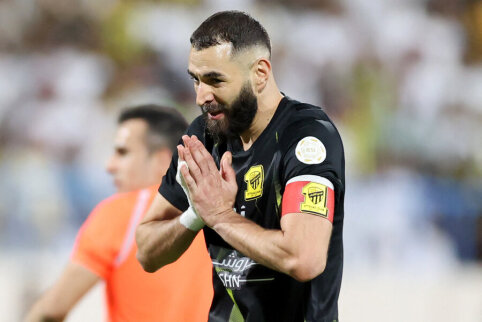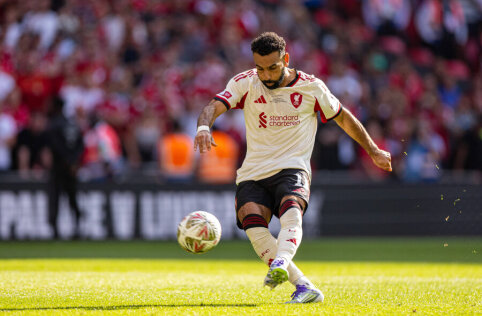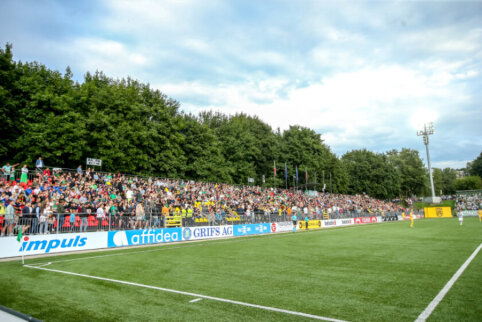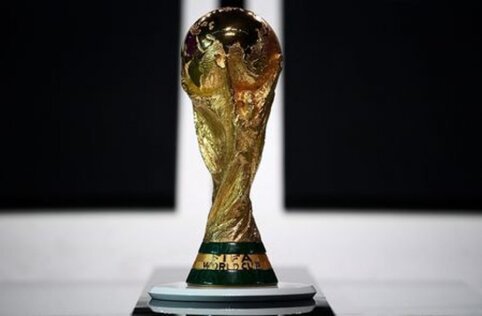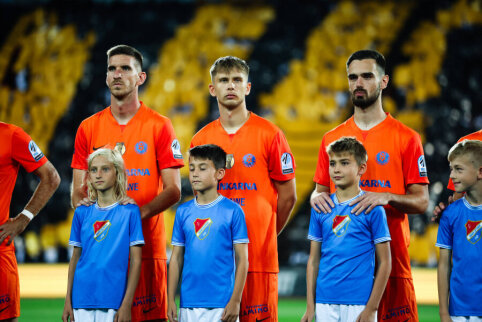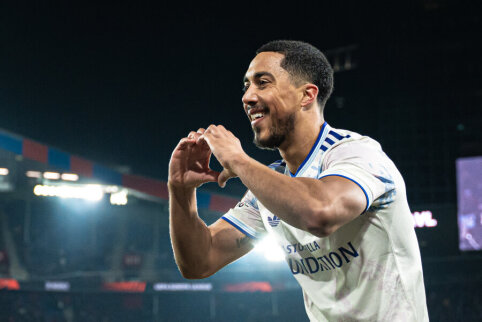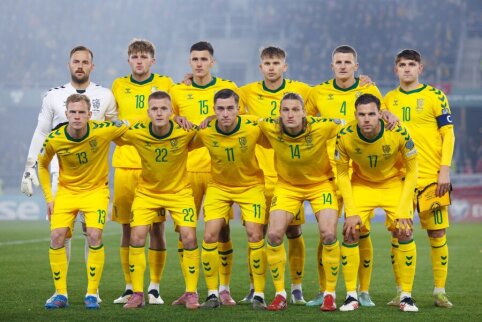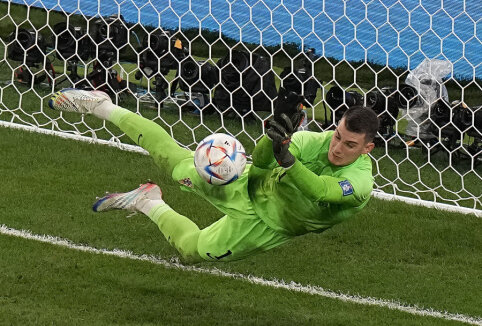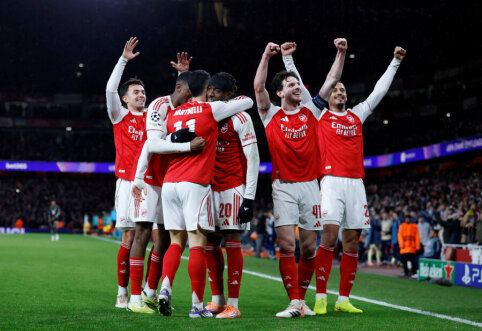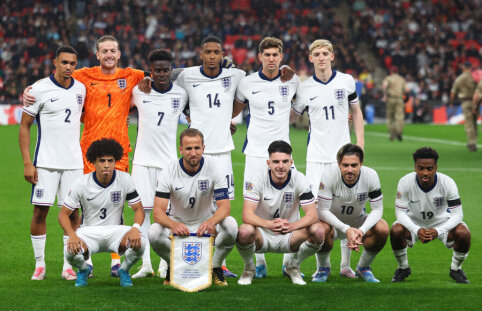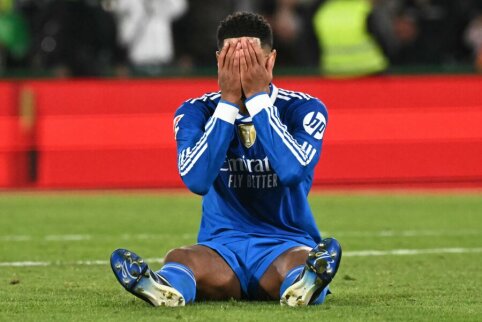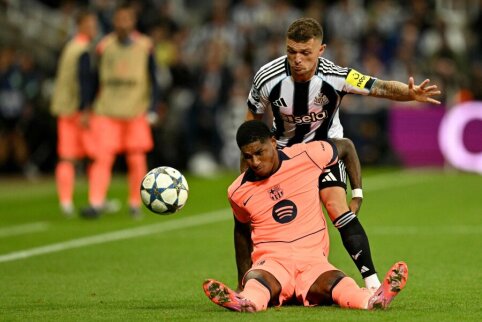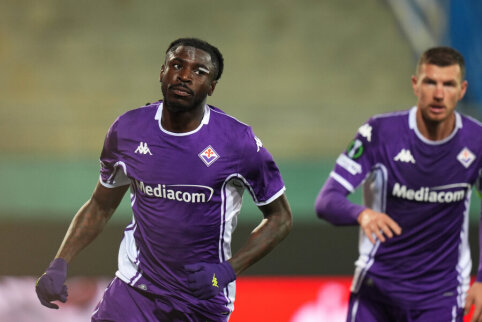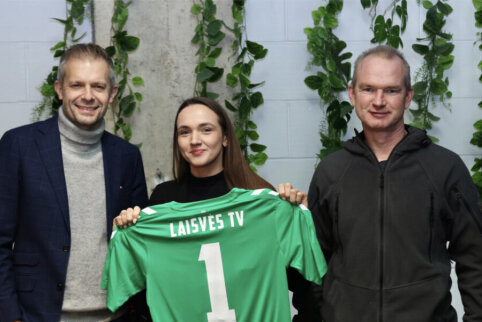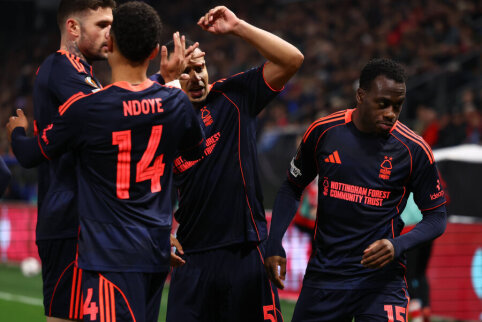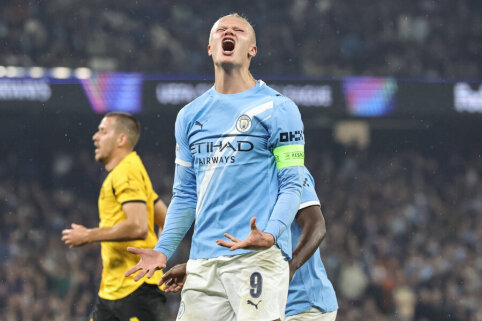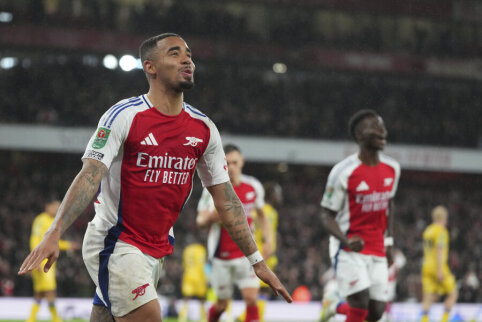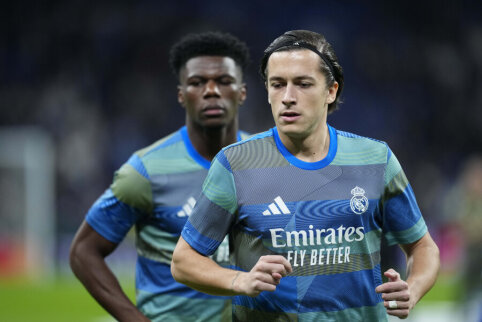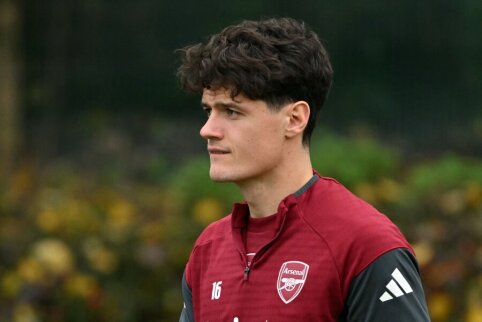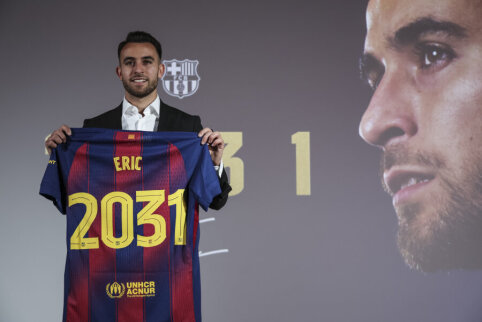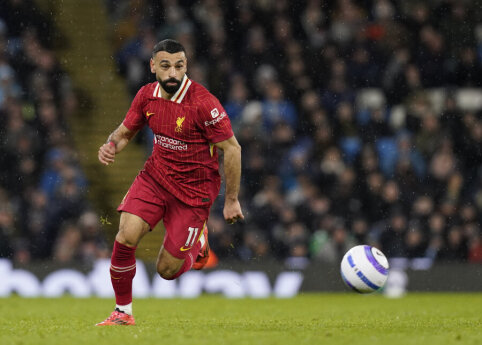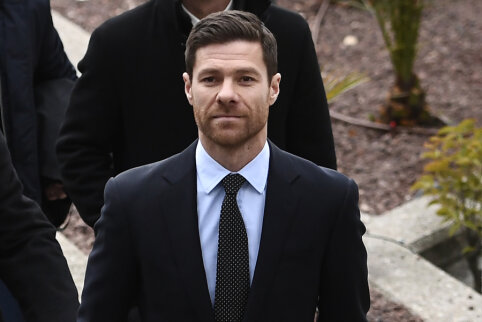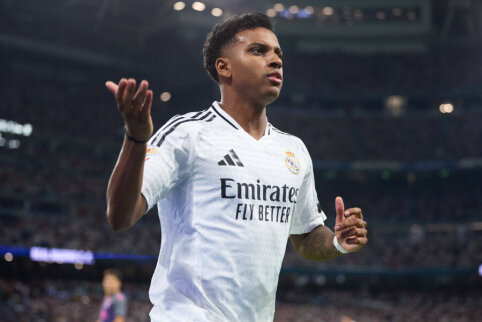 © EuroFootball.com
© EuroFootball.com
During the UEFA Jubilee Year of 2004, Arminas Narbekovas, a former legendary goalkeeper of "Žalgiris," was recognized as the best Lithuanian footballer in the last 50 years. EuroFootball.com offers an insight into the career of this talented player.
Arminas Narbekovas
Born on November 28, 1965 in Gargždai
Clubs
Vilnius "Žalgiris" (1983-1990)
Moscow "Lokomotiv" (1990)
Vienna "Austria" (1990-1996)
Modling "Admira Wacker" (1996-1998, 1999-2000)
"St. Pölten" (1998-1999)
"SV Hundsheim" (2000-2001)
Vienna "Wiener Sportclub" (2001-2003)
"SV Gr.Weikersdorf" (2003-2004)
Achievements
1985, 1986, 1987, 1988 - Best Lithuanian footballer
1987 - Universiade Champion
1987 - USSR Championship bronze medalist
1988 - Seoul Olympic Games champion
1991, 1992, 1993 - Austrian champion
1991, 1992, 1993 - Austrian Cup winner
2004 - Recognized as the best Lithuanian footballer in 50 years by UEFA
2005 - Honored with the KKSD Honorary Team Commander badge "For Merits to Lithuanian sports"
Born in Gargždai, Arminas initially attended football training with kids 3 years older, but it was only when coach Michail Terentjevas took over that his age group was formed. Interestingly, it was composed of classmates and friends from his neighborhood, including a famous footballer. At the age of 12, he moved to the Panevėžys sports boarding school, where he was coached by Vytautas Blinstrubas. Interestingly, Blinstrubas now works at his former student's football school. It was only after finishing school that Arminas Narbekovas was invited to join the team by Benjaminas Zelkevičius.
On April 19, 1983, eighteen-year-old Arminas Narbekovas made his debut for Vilnius "Žalgiris" team, which in turn debuted in the higher league of the USSR. To this day, A.Narbekovas remembers his first goal for "Žalgiris." The young goalkeeper's long-range shot secured a 5-0 victory against Kišiniovo's "Nistru." In total, during his first season, the footballer appeared on the field 8 times and scored 2 goals.
Establishing himself in the new club was relatively easy for A.Narbekovas, as he himself pointed out the reason: "I was very lucky, there were many good players in the club, like Stasys Danisevičius or Vaclovas Jurkus, who were like examples, their support helped me to establish myself in the team."
From 1984 to 1986, A.Narbekovas played 70 matches for "Žalgiris," scoring 20 goals. In 1986, he became the team's top scorer.
The glory days for the entire "Žalgiris" team and the player himself came in 1987. Playing as a right-back, A.Narbekovas scored 16 goals in 30 matches and ranked 2nd among the league's top scorers. Even more important was the third place secured by "Žalgiris" in the championship. This was the only time that the Vilnius team managed to climb onto the podium of the USSR Supreme League champions.
In the same year, "Žalgiris" won another trophy. The Vilnius team was chosen to represent the Soviet Union team at the World University Games. The "Žalgiris" justified the trust and brought home the gold medals from Zagreb.
A.Narbekovas described the successful change of times and team maturity as the main reasons that led to such a good team performance. In 1987, the footballer referred to it as the team's flowering years.
1988 - The Seoul Olympic Games. Two Lithuanians were called up to the USSR national team: Arvydas Janonis and Arminas Narbekovas. The team played in the group stage, drawing with South Korea 0-0, beating Argentina 2-1 and the USA 4-2. In the quarterfinals, they defeated Australia 3-0, and in the semifinals, Italy after extra time (3-2). A.Narbekovas became the hero of those matches, scoring the decisive 3rd goal for the USSR national team. The player himself remembers this goal as one of the most important in his career.
The Olympic Games final saw Brazil facing the USSR. The main time ended in a draw: 1-1. In extra time, an extra goal was scored, and the gold medals were won by the Soviet Union team. The Brazilians, who had stars like Romario, Bebeto, and Taffarel, had to settle for second place.
Reflecting on the Olympics, A.Narbekovas said nostalgically: "The two weeks passed like a dream, in which everything goes well." Upon his return from Seoul, the footballer was also awarded the title of deserving sports master.
In the same year, "Žalgiris" debuted in the UEFA Cup. Already in the first round, they faced strong but beatable opponents - Vienna "Austria." In Vilnius, in front of 17,000 spectators, a 2-0 victory was achieved, but it was not enough to advance to the next stage. Before the return leg, injuries thinned out the team, and A.Narbekovas himself compared his condition at the time to a squeezed lemon.
Nevertheless, he took to the field, and the match started off successfully for the "Žalgiris" - already in the 3rd minute, Virginijus Baltušnikas scored a goal. Despite a great start, the match was lost 2-5, and the Austrians advanced to the next stage. This match had a decisive significance for A.Narbekovas's career. Two years later, he became a player for a Vienna club.
The end of the following season promised changes for A.Narbekovas: he was of interest to Spain's "Zaragoza," and the USSR national team coach Valerij Lobanovskis hinted that A.Narbekovas and Valdas Ivanauskas would be included in the national team for the upcoming World Cup in Italy. However, the political situation in Lithuania disrupted the athlete's plans. After Lithuania regained independence on March 11, 1990, its footballers lost the opportunity to travel abroad and participate in the World Cup (Lithuania was not yet a member of UEFA).
However, a solution was found. The interim stop on A.Narbekovas's way to Austria was the Moscow "Lokomotiv" club, which helped facilitate an agreement with coach Benjaminas Zelkevičius. The footballer signed a contract with the Moscow team and represented them for a few months, then calmly moved to Vienna. Together with him, another "Žalgiris" player - Valdas Ivanauskas - also left. For the first time in history, an Austrian club had two players from the Soviet Union in its lineup. During his 7 seasons at "Žalgiris," A.Narbekovas played 156 matches and scored 51 goals.
In the Vienna club, A.Narbekovas and Valdas Ivanauskas immediately managed to establish themselves in the first team. With "Austria," Arminas became Austrian champion 3 times (1991, 1992, 1993) and won 3 Austrian Cups (1990, 1992, 1994). However, playing on the international stage was not as successful. In the UEFA Cup, the team reached the third qualifying round multiple times, where they faced formidable opponents: once they were blocked by "Barcelona," another time by London's "Arsenal" club.
It was close for the footballer's path to turn towards Germany (where Valdas Ivanauskas moved). But injuries got in the way. Initially, A.Narbekovas drew the interest of Bremen's "Werder" team, and coach Otto Rehhagel even came to Vienna to watch the derby between "Austria" and "Rapid" clubs to see the Lithuanian's game with his own eyes. However, in the final training session before the match, he suffered a calf muscle injury, and it was "Rapid" who went to Germany with O.Rehhagel.
A little later, in a friendly match, "Vienna" defeated Leverkusen's "Bayer" team 3-0. A.Narbekovas performed excellently in that match: he made two assists and scored a goal himself. The German club immediately began negotiations with the player against "Austria," but once again, a leg injury - the same calf muscle - got in the way. Surgery was needed, and the Leverkusen club did not wait. Thus, A.Narbekovas remained in the Vienna club until 1996.
After the restoration of Lithuania's independence, the Lithuanian national team was formed. The first friendly match played by the Lithuanians was on May 27, 1990, in Tbilisi. The Lithuanian team was made up solely of "Žalgiris" players. The match, watched by 55,000 spectators, ended in a 2-2 draw. A.Narbekovas scored the first Lithuanian goal.
One of the most important goals the player recalls is the one he scored in the World Cup qualifier against Northern Ireland (the match ended in a 2-2 draw). In total, wearing the Lithuanian national team jersey, A.Narbekovas played 13 matches, scoring 4 times. His last match for the current "Žalgiris" president in the national team was played in the fall of 2001 in Kaunas when he briefly took to the field at the end of the match against Italy. The match ended in a 0-0 draw.
In 1996, the sunset of A.Narbekovas's football career began. From the Vienna club, he moved to the Modling "Admira Wacker" team. Later followed by "St. Pölten," "SV Hundsheim," "Wiener Sportclub," "SV Gr.Weikersdorf" clubs.
Finally, in November 2005, one of the best Lithuanian footballers of all time returned to his homeland, not as a player or coach. A.Narbekovas became the president of Vilnius "Žalgiris" club. When asked if it was difficult to decide to return, he replied: "It was not difficult to decide to return, but it was difficult to leave the family behind."
In 2005, A.Narbekovas was awarded the KKSD Honorary Team Commander badge "For Merits to Lithuanian sports" by the Lithuanian Department of Physical Culture and Sports. The player himself considered this award the most important after the Olympic gold medal and the third place in the USSR championship won with "Žalgiris."
In 2006, A.Narbekovas was voted the best Lithuanian footballer in the last 50 years. The player's hometown, Gargždai, did not forget about him: a bronze foot was cast according to his footprint, which now stands in the central square of Gargždai city. In Vilnius, the "Žalgiris"-A. Narbekovas Football School is currently active.
Asked how important these awards are, A.Narbekovas replied: "It's nice when your work is appreciated, you realize that you did your job well."
